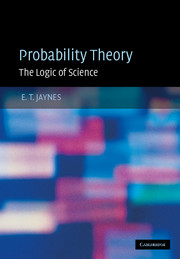Book contents
- Frontmatter
- Contents
- Editor's foreword
- Preface
- Part I Principles and elementary applications
- Part II Advanced applications
- Appendix A Other approaches to probability theory
- Appendix B Mathematical formalities and style
- Appendix C Convolutions and cumulants
- References
- Bibliography
- Author index
- Subject index
Preface
Published online by Cambridge University Press: 05 September 2012
- Frontmatter
- Contents
- Editor's foreword
- Preface
- Part I Principles and elementary applications
- Part II Advanced applications
- Appendix A Other approaches to probability theory
- Appendix B Mathematical formalities and style
- Appendix C Convolutions and cumulants
- References
- Bibliography
- Author index
- Subject index
Summary
The following material is addressed to readers who are already familiar with applied mathematics, at the advanced undergraduate level or preferably higher, and with some field, such as physics, chemistry, biology, geology, medicine, economics, sociology, engineering, operations research, etc., where inference is needed. A previous acquaintance with probability and statistics is not necessary; indeed, a certain amount of innocence in this area may be desirable, because there will be less to unlearn.
We are concerned with probability theory and all of its conventional mathematics, but now viewed in a wider context than that of the standard textbooks. Every chapter after the first has ‘new’ (i.e. not previously published) results that we think will be found interesting and useful. Many of our applications lie outside the scope of conventional probability theory as currently taught. But we think that the results will speak for themselves, and that something like the theory expounded here will become the conventional probability theory of the future.
History
The present form of this work is the result of an evolutionary growth over many years. My interest in probability theory was stimulated first by reading the work of Harold Jeffreys (1939) and realizing that his viewpoint makes all the problems of theoretical physics appear in a very different light. But then, in quick succession, discovery of the work of R. T. Cox (1946), Shannon (1948) and Pólya (1954) opened up new worlds of thought, whose exploration has occupied my mind for some 40 years.
- Type
- Chapter
- Information
- Probability TheoryThe Logic of Science, pp. xix - xxxPublisher: Cambridge University PressPrint publication year: 2003



